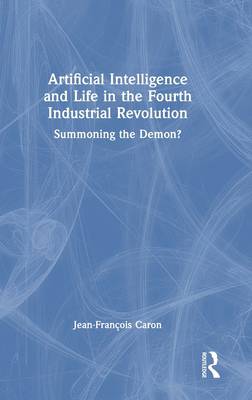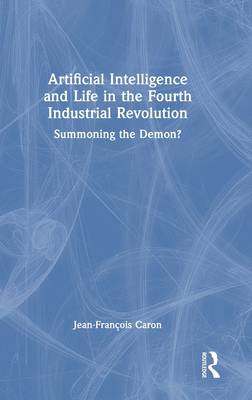
- Afhalen na 1 uur in een winkel met voorraad
- Gratis thuislevering in België vanaf € 30
- Ruim aanbod met 7 miljoen producten
- Afhalen na 1 uur in een winkel met voorraad
- Gratis thuislevering in België vanaf € 30
- Ruim aanbod met 7 miljoen producten
Zoeken
Artificial Intelligence and Life in the Fourth Industrial Revolution
Summoning the Demon?
Jean-François Caron
Hardcover | Engels
€ 290,45
+ 580 punten
Uitvoering
Omschrijving
This book considers the core theoretical concepts central to understanding Artificial Intelligence (AI) and the Fourth Industrial Revolution, providing a clear view of what machines can achieve and what sets them apart from humans. Adopting a balance between an overly critical view fuelled by fear and an uncritical openness based upon the potential benefits, the author argues human uniqueness isn't inherently threatened by these new technologies, but this does not mean we should use them without restrictions or care. Importantly, he considers the ways human uniqueness will have to evolve as more of our current tasks become automated, and the potential for great improvements in the human condition this might bring as we are forced to shift our attention towards the tasks only we can fully achieve. This accessible, thorough analysis offers anyone interested in the positive and negative implications of AI, autonomous robots, machine-learning, and other technologies of the Fourth Industrial Revolution to enjoy a broad, accessible, and theoretically sound overview of what the new technologies mean to us as humans.
Specificaties
Betrokkenen
- Auteur(s):
- Uitgeverij:
Inhoud
- Aantal bladzijden:
- 224
- Taal:
- Engels
Eigenschappen
- Productcode (EAN):
- 9781032885261
- Verschijningsdatum:
- 14/08/2025
- Uitvoering:
- Hardcover
- Formaat:
- Genaaid
- Afmetingen:
- 156 mm x 234 mm
- Gewicht:
- 503 g

Alleen bij Standaard Boekhandel
+ 580 punten op je klantenkaart van Standaard Boekhandel
Beoordelingen
We publiceren alleen reviews die voldoen aan de voorwaarden voor reviews. Bekijk onze voorwaarden voor reviews.











